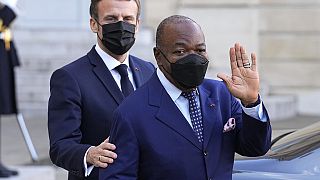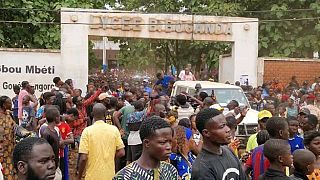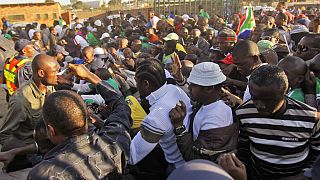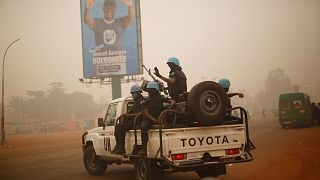Central African Republic
The UN will withdraw Gabon's 450-strong peacekeeping contingent from the Central African Republic over sexual abuse allegations, a scourge that has long tarnished UN interventions, Gabon's defence ministry said Wednesday.
"In recent weeks, exceptionally serious acts that go against military ethics and the honour of the armed forces, committed by certain elements in the Gabonese battalions... have been reported," the ministry said in a statement sent to AFP.
"Following many cases of alleged sexual exploitation and abuse that are being processed, the United Nations today decided to withdraw the Gabonese contingent from MINUSCA", the UN mission in the CAR, and "an investigation has been opened by Gabon," the statement read.
One of the world's poorest countries, CAR has been chronically unstable since it gained independence from France in 1960.
The former French colony is currently suffering from the aftermath of a brutal civil conflict that erupted in 2013 after a coup against then-president Francois Bozize.
MINUSCA was deployed by the UN in April 2014 to try to end the conflict pitting the Seleka coalition of armed groups that overthrew Bozize against militias supporting him.
The conflict has dramatically reduced in intensity, but MINUSCA still has 15,000 personnel in the country, of whom 14,000 are in uniform.
Their main mission is to protect civilians.
- 822 claims of sex crimes -
Allegations of sexual crimes involving peacekeepers in CAR have been recurrent.
If the "alleged facts... are proven, the perpetrators will be brought before the military courts and judged with extreme rigour", Gabon's defence ministry said.
"Gabon has always demanded irreproachable and exemplary behaviour from its army, both on its territory and abroad."
The UN has struggled for years over allegations of sexual exploitation and abuse by UN peacekeepers around the world.
Since 2010, it has posted 822 such allegations on its website.
By nationality, the peacekeepers with the most allegations against them since 2015 have been Cameroon, with 44 cases, South Africa (37), the Democratic Republic of Congo (32), Gabon (31) and the Republic of the Congo (26).
In March 2018, Gabon had announced it planned to withdraw its contingent because the conflict was abating.
But at the time there were allegations of sexual abuse involving the Gabon contingent.
However, three months later, at the behest of CAR President Faustin-Archange Touadera, his Gabonese counterpart Ali Bongo Ondimba said the Gabon contingent would stay on.
Already by late 2016, Libreville announced investigations into 15 of its troops suspected of committing sexual assaults.
That same year and in 2017, more than 700 soldiers from the Republic of Congo were sent away after allegations of sexual assaults and various other offences.
In 2014, French soldiers from the Sangaris operation, a peacekeeping force in CAR authorised by the UN, were also accused of raping children aged seven to 13.
France opened a probe which was later dismissed.
The two armed groups that clashed in the civil war have also been accused of committing war crimes and crimes against humanity between 2014 and 2015.
The civil war has dropped in intensity since 2018 but armed groups, some with past links to the Seleka or anti-Balaka, occupied more than two-thirds of the country until late last year.
Some of them launched a rebellion against the administration of Touadera, who was re-elected on December 27, 2020.
His army, with the support of hundreds of Russian paramilitaries and Rwandan soldiers, have today largely reconquered lost territory.











01:22
World will have to learn to live with heatwaves, UN says
01:39
Sustainable development financing conference opens in Seville
01:35
UN and Haitian officials mark one year since Kenyan police arrived to support security efforts
01:42
Gaza residents welcome rare organized aid delivery after months of chaos and hunger
01:50
UN urges renewed political and climate action in Libya amid humanitarian and governance crises
00:58
Cash crunch stalls UN probe into possible war crimes in DR Congo